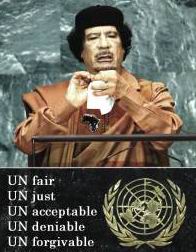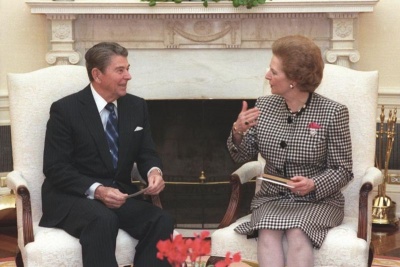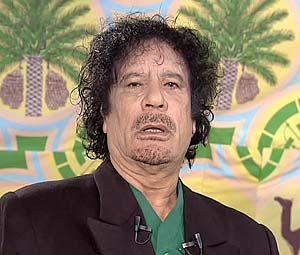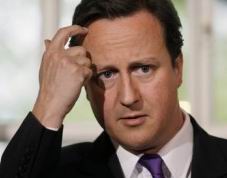Muammar Gaddafi
Colonel Muammar Gaddafi was born into a peasant Bedouin family in Libya in 1942. Controversy surrounded Gaddafi whose followers compared him to the prophet Mohammed, and claimed that he was a messenger and thinker in the tradition of the North African holy man. However, the West was for a long time deeply sceptical of this viewpoint, often stating that Gaddafi posed a threat to world peace by sponsoring terrorism.
Colonel Gaddafi became leader of the Great Socialist People's Libyan Arab Jamahiriya in 1969, following a bloodless coup. In theory, this organisation was a "state of the masses," governed by the people through a system of local councils. In practice, though, it was a military dictatorship controlled by Gaddafi. He had no official title, although he was effectively head of state and had been since 1969. His Green Book was "an attempt to explain the dialectic which exists between Marxism and Capitalism" and in it Gaddafi proposed his Third Universal Theory - claiming that there was a third way, beyond communism and capitalism, through which social harmony could be achieved. His ideas were allegedly based around democracy, equality, and communion with nature.
However, Colonel Gaddafi supported terrorist organisations including the IRA in Ireland, and the Spanish Basque separatist movement ETA. He had also shown strong support - both moral and financial - for the African National Congress (ANC) and its leader Nelson Mandela.[1]
In the early 1980s, Gaddafi was interviewed by Jana Wendt of Australian TV's 60 Minutes series about Israel's invasion of Lebanon.[2]
Contents
Lockerbie bombing
For many years, Colonel Gaddafi harboured the two Libyans alleged to have been responsible for the bombing of Pan Am Flight 103 over Lockerbie in Scotland, refusing to extradite them or accept responsibility and pay compensation for the Lockerbie bombing. For most of the 1990s, Libya endured economic sanctions and diplomatic isolation as a result of Gaddafi's refusal to allow the extradition of the two accused.
In August 2003, two years after Abdelbaset Ali Mohmed Al Megrahi's conviction in a Scottish court at a former US Air Force base at Camp Zeist in the Netherlands, Libya wrote to the United Nations formally accepting 'responsibility for the actions of its officials' in respect of the Lockerbie bombing and agreed to pay compensation of up to $2.7 billion to the families of the 270 victims. The same month, Britain and Bulgaria co-sponsored a UN resolution which removed the sanctions.
Following the overthrow of Saddam Hussein in 2003, Gaddafi announced that his nation had an active weapons of mass destruction programme, but that he was willing to allow international inspectors into his country to observe and dismantle them. As a result, the United States announced that it would restore full diplomatic relations with Libya once Gaddafi declared he was abandoning Libya's WMD programme.
In March 2004, British Prime Minister Tony Blair became one of the first western leaders in decades to visit Libya and publicly meet Gaddafi. The visit paved the way for greater cooperation between Libya and the UK as the countries pursued trade deals, and also helped to legitimise Gaddafi's rehabilitation in the West. The tour was followed by that of French president Nicolas Sarkozy in July 2007, who went to Libya and signed a number of bilateral and multilateral EU agreements. The changing tide also allowed Gaddafi to host US Secretary of State Condoleezza Rice in September 2008. Next came a historic cooperation treaty between Libya and Italy, which was signed in Benghazi by Gaddafi and Italian Prime Minister Silvio Berlusconi.
United Nations speech

On 23 September 2009, Colonel Muammar Gaddafi famously addressed the United Nations General Assembly (UNGA). In the course of his rambling 96-minute speech, Colonel Gaddafi demanded that the Libyan President of UNGA, Dr Ali Treki, should set in train a number of UN inquiries into:
- the Korean war;
- the Suez invasion;
- the Vietnam war;
- the Iraq invasion;
- the Afghan invasion;
- the assassination of Patrice Lumumba;
- the assassination of UN Secretary-General Dag Hammarskjöld;
- the assassination of President John F Kennedy; and,
- the assassination of Martin Luther King.[3]
Surprisingly, though, Colonel Gaddafi failed to demand a UN inquiry into the assassination of UN Commissioner for Namibia, Bernt Carlsson, the highest profile victim of the 1988 Lockerbie bombing. Gaddafi did however make a point of attacking the UN Security Council (UNSC), calling it the "UN Terror Council". Within two years of that UNGA speech, the UNSC struck back and deposed Gaddafi after 42 years in power in Libya.[4]
Conspiracy by Reagan and Thatcher

On 2 December 2010, in a video conference link to staff and students at the London School of Economics, Colonel Gaddafi alleged that the case against Abdelbaset Ali Mohmed Al Megrahi had 'been fabricated and created by' Britain's former Prime Minister Margaret Thatcher and former US President Ronald Reagan. He suggested that US CIA officials had been behind the 21 December 1988 Lockerbie bombing in which 270 people were killed.
"These are the people who created this conspiracy" said Gaddafi, referring to the alleged role of Thatcher and Reagan in Megrahi's conviction and life sentence over the attack on Pan Am Flight 103. "The charges directed towards Libya were based on unfounded evidence in an attempt to weaken the Libyan Revolution and limit its resources and abilities".[5]
In making his allegation, Gaddafi did not include ex-President (and former CIA Director) George H W Bush in this conspiracy. This may suggest that if Thatcher and Reagan had indeed 'fabricated and created' the Lockerbie bombing case against Libya, they would have done so in the interregnum between the 8 November 1988 US presidential election and President Bush taking over from Reagan on 20 January 1989.
Gaddafi's alleged Lockerbie conspiracy could well have been hatched on 15 November 1988 when President Reagan and Prime Minister Thatcher were photographed in the White House library and would undoubtedly have discussed Iran's threat to retaliate massively for the shooting down of Iran Air Flight 655 by USS Vincennes on 3 July 1988 with the loss of 290 civilian lives. The two leaders might then have decided to open secret negotiations with Iran and seek to limit the revenge attack to just one US aircraft. The US and UK would not have wanted to antagonise the Iranians further by blaming Iran for the retaliation, so would have selected 'mad dog' Gaddafi to be their whipping boy.
Western Intelligence Agencies (including apartheid South Africa's National Intelligence Service) would have been party to such negotiations and would have had a say in selecting the sacrificial aircraft. Thus on 22 December 1988 (the day after the Lockerbie bombing), President Reagan phoned Downing Street:[6]
"Margaret, I understand you have just returned from the site of the Pan Am crash. I want to thank you for your expression of sorrow on the Pan Am 103 tragedy. On behalf of the American people, I also want to thank the rescue workers who responded so quickly and courageously. Our thoughts and prayers are with the victims of this accident, both the passengers on the plane and the villagers in Scotland".
On 28 December 1988, seven days after the Lockerbie bombing, when there was as yet no evidence ostensibly pointing to Libyan culpability, Ronald Reagan in one of the last acts of his Presidency, extended sanctions against Libya and threatened renewed bombing raids.[7]
Sure enough, the joint US/UK investigation into the bombing soon found 'evidence' pointing towards Libya for the sabotage of Pan Am Flight 103. According to author and journalist, Ian Ferguson, it was a case of 'reverse engineering' whereby Libya had been fitted up for the crime and the inculpatory evidence followed (see the 2009 documentary film Lockerbie Revisited).[8]
UNSC authorised NATO bombing

Unwilling to be forced out of office like Egypt's Hosni Mubarak and Tunisia's Zine El Abidine Ben Ali, Colonel Gaddafi allegedly ordered a violent crackdown after political protests began in Libya in February 2011. The Gaddafi regime lost control of the east of the country and responded by threatening military force against the rebels.
By March 2011 the UN Security Council had declared a no fly zone over the country, with NATO forces bombing military targets on the pretext of protecting civilians from Gaddafi's forces. On 5 April 2011, in an interview on BBC Radio 4's Today Programme, Colonel Gaddafi's son Saif al-Islam said:[9]
"The British and the Americans they know about Lockerbie. They know everything about Lockerbie. So there's no secret anymore about Lockerbie."
In June 2011, the International Criminal Court issued an arrest warrant against Gaddafi, his son Saif al-Islam and intelligence chief al-Senussi for alleged crimes against humanity. In August 2011, the NATO bombing of Libya intensified, with the rebel forces gaining control of the capital Tripoli. Gaddafi's compound was taken over and one of his sons detained by rebels. News footage showed rebels entering the city's main square and tearing down pictures of Gaddafi.
Gruesome death
On 20 October 2011, news reports stated that the Libyan leader had been captured by rebel forces near his hometown Sirte. He had been travelling in a convoy of vehicles targeted by a French air strike, which killed dozens of loyalist fighters in a convoy of vehicles, and injured Gaddafi. He hid in a tunnel with several of his bodyguards but was soon discovered by rebels. Gaddafi was shot shortly after being captured and several news channels showed a video of his gruesome death.[10]
Cameron's Lockerbie secret
Prime Minister David Cameron has a secret about Lockerbie. It’s a secret that explains why the PM was desperate to have Colonel Gaddafi blamed personally for the sabotage of Pan Am Flight 103 on 21 December 1988, and to have Gaddafi executed without a trial.
Three months after the Lockerbie bombing, the then Prime Minister Margaret Thatcher and the rising star in Conservative Research Department, David Cameron, visited apartheid South Africa.[11]
The past and future British Prime Ministers made a point of visiting the Rössing Uranium Mine in Namibia (illegally occupied by apartheid South Africa in defiance of UN Security Council Resolution 435). In 1989, the Rössing mine was jointly owned by Rio Tinto Group and the Iranian Government, and was supplying uranium to develop Iran’s nuclear programme. Mrs Thatcher was so impressed with the Rössing Uranium Mine that she declared it made her "proud to be British", a sentiment echoed by Mr Cameron.[12]
It has recently been reported that Margaret Thatcher and David Cameron concluded a secret nuclear deal with the apartheid regime during their visit in 1989.[13]
On 21 December 1988, Assistant Secretary-General of the United Nations and UN Commissioner for Namibia, Bernt Carlsson, was the most prominent of the 270 victims of the Lockerbie bombing. In the months leading up to his death, Carlsson had warned that he would start proceedings against the countries and firms which had been defying UN law over many years by stealing billions of pounds-worth of Namibia's natural resources. Among those facing huge UN compensation claims were Rio Tinto Group, the government of Iran, the diamond mining giant De Beers and the apartheid regime. Because the UN Commissioner for Namibia was killed at Lockerbie, none of those prosecutions ever took place.[14]
The latest evidence suggests that Iran and apartheid South Africa targeted UN Commissioner for Namibia, Bernt Carlsson, on Pan Am Flight 103 and that Libya was not responsible for the Lockerbie bombing.[15]
Which explains why Prime Minister David Cameron was desperate to have Colonel Gaddafi blamed personally for the sabotage of Pan Am Flight 103 on 21 December 1988, and to have Gaddafi executed without a trial at the International Criminal Court.[16]
See also
External links
- "A Medal of Good Hope: Mandela, Gaddafi and the Lockerbie Negotiations"
- "Destroying Libya and World Order: The Three-Decade U.S. Campaign to Terminate the Qaddafi Revolution"
- "Lockerbie: CIA 'fitted up' Gaddafi at the UN Security Council"
- "Lockerbie: CIA made State Department attorney 'lie' to UN Security Council"
- "Lockerbie: Pik 'n' Miss"
References
- ↑ "Colonel Gaddafi Biography"
- ↑ Muammar Gaddafi interviewed on Australian TV
- ↑ "Colonel Gaddafi's speech to the UN General Assembly"
- ↑ "CIA Planned Gaddafi's Overthrow Thirty Years Ago"
- ↑ "Lockerbie bomber's family preparing to sue Britain for false imprisonment"
- ↑ "Reagan phone call to Thatcher at Downing Street"
- ↑ "Exploding Lockerbie – Part 2"
- ↑ "Lockerbie conspiracy by Thatcher and Reagan"
- ↑ "BBC Radio interview with Saif al-Islam"
- ↑ "Muammar Gaddafi: How he died"
- ↑ "Cameron's freebie to apartheid South Africa"
- ↑ "Rössing Uranium Mine"
- ↑ "How the US and UK 'lost' three nuclear weapons"
- ↑ "Bernt Carlsson and the Case of the Disappearing Diamonds"
- ↑ "Lockerbie: Ayatollah’s Vengeance Exacted by Botha’s Regime"
- ↑ "David Cameron's Libyan war: why the PM felt Gaddafi had to be stopped"

